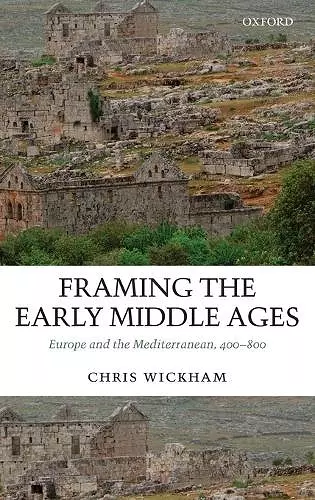Framing the Early Middle Ages
Europe and the Mediterranean, 400-800
Format:Hardback
Publisher:Oxford University Press
Published:22nd Sep '05
Currently unavailable, and unfortunately no date known when it will be back
This hardback is available in another edition too:
- Paperback£66.00was £66.00(9780199212965)

Chris Wickham's Framing the Early Middle Ages offers a groundbreaking comparative analysis of socio-economic changes from 400 to 800 AD, integrating archaeological and documentary evidence.
In Framing the Early Middle Ages, Chris Wickham explores the complexities of early medieval history, which is often viewed through a fragmented lens. Unlike the Roman Empire, which is typically understood as a cohesive entity, the early Middle Ages are perceived as a collection of regional narratives that align with modern nation-states. This perspective has led to a lack of comprehensive syntheses regarding socio-economic changes in the post-Roman world, particularly since the 1930s. Wickham addresses this gap by integrating archaeological findings with documentary evidence to create a more cohesive understanding of the period from 400 to 800 AD.
Wickham's work emphasizes the importance of a comparative history that spans various regions, from Denmark to Egypt, while intentionally excluding Slav territories. The book delves into key socio-economic themes such as state finance, aristocratic wealth and identity, estate management, and rural settlement patterns. These themes serve as a framework for understanding broader developments of the era, which cannot be fully grasped in isolation. By analyzing these elements, Wickham aims to provide a richer context for the complexities of early medieval society.
The author argues for a complex comparative analysis as the foundation for a more comprehensive synthesis of early medieval history. Instead of treating a single region's development as 'typical,' Framing the Early Middle Ages considers all variations as normative, thereby fostering a deeper understanding of the differences that shaped this transformative period. This ambitious work stands as a significant contribution to the study of early medieval history.
history doesn't get any better * Benjamin Schwarz, The Atlantic Monthly *
a tremendous achievement, demonstrating mastery over half a dozen fields of scholarship. * David Abulafia, THES *
It raises the bar for all future discussion of large-scale historical change, and not just for this period, but it also shows us how we may occasionally scramble over it. * TLS *
Combining close documentary analysis with the latest archaeological research, it is extraordinarily ambitious and wide-ranging, and one of the great scholarly achievements of the year. * Dominic Sandbrook, The Daily Telegraph *
The reader will not only learn an immense amount but constantly and actively engage both with the material and the arguments of this tremendously rich book. * John Hudson, BBC History *
Wickham's work is groundbreaking ... Some of his conclusions may and should be debated, but they rest on an array of evidence and on a series of complex atguments that further discussions should not ignore. * Walter Pohl, Speculum *
a magisterial study * Medium Aevum, Vol. LXXV *
- Winner of Joint Winner of the Wolfson Prize for History 2005 Winner of the 2006 Isaac and Tamara Deutscher Memorial Prize Winner of the AHA James Henry Breasted Prize for 2006.
ISBN: 9780199264490
Dimensions: 242mm x 163mm x 60mm
Weight: 1273g
1017 pages